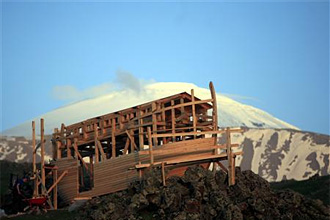 |
 |
 |
 Editorials | Environmental | November 2007 Editorials | Environmental | November 2007  
Noah's Ark Flood Spurred European Farming
 Michael Kahn - Reuters Michael Kahn - Reuters
go to original


| | A Greenpeace volunteer ends the day's work during sunset as they build a modern day version of the legendary Noah's Ark on Mount Ararat, eastern Turkey, May 21, 2007 as part of a project to draw attention to global warming. An ancient flood some say could be the origin of the story of Noah's Ark may have helped the spread of agriculture in Europe 8,300 years ago by scattering the continent's earliest farmers, researchers said on Sunday. (Reuters/Fatih Saribas) |
London - An ancient flood some say could be the origin of the story of Noah's Ark may have helped the spread of agriculture in Europe 8,300 years ago by scattering the continent's earliest farmers, researchers said on Sunday.

Using radiocarbon dating and archaeological evidence, a British team showed the collapse of the North American ice sheet, which raised global sea levels by as much as 1.4 meters, displaced tens of thousands of people in southeastern Europe who carried farming skills to their new homes.

The researchers said in the journal Quaternary Science Reviews their study provides direct evidence linking the flood that breached a ridge keeping the Mediterranean apart from the Black Sea to the rise of farming in Europe.

"The flooding of the Black Sea was not well dated but we got it down to about 50 years," said Chris Turney, a geologist at the University of Exeter, who led the study. "As soon as the flooding is done, farming goes crazy across Europe."

The researchers created reconstructions of the Mediterranean and Black Sea shoreline before and after the rise in sea levels. They estimated the flood covered some 73,000 square kilometers over a 34-year period, causing mass displacement of people.

Previous archaeological evidence has shown communities in the region were already farming when the flood hit. The Exeter team suggests the mass migration caused a sudden expansion of farming and pottery production across the continent.

"We looked at all the earliest data on farming in Europe and we found a little bit of farming in Greece and the Balkans just before the flood," Turney said in a telephone interview. "When the flood happened, farming seemed to stop but it was re-established a generation later across Europe."

The researchers believe these people took their skills to new areas previously populated by hunters and gatherers where there had been no evidence of farming, Turney said.

The study also underscores the potential impact rising sea levels may have in the future, the researchers said. An expected one meter rise by the end of the century due to climate change would displace some 145 million people, Turney added.

It also paints a picture of the kind of mass disruption that has prompted some scientists to link the ancient flood to the origins of the biblical story of Noah's Ark, Turney said.

"When the Black Sea flooded at end of last ice age some people have suggested it was the origins of the Noah's Ark myth," he said. "If you lived in that basin it would have seemed like the whole world had flooded."

(Editing by Maggie Fox and Catherine Evans) | 
 | |
 |



